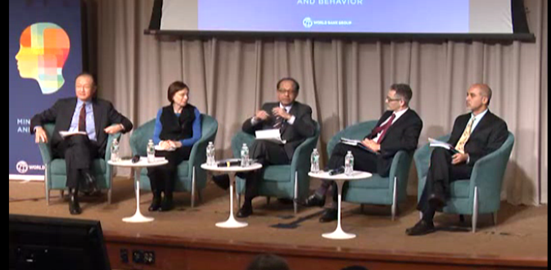The 2015 World Development Report was launched last week by the President of the World Bank, Jim Yong Kim, and our own CEO, Dr David Halpern (see the video of the launch here). David sent back this blog from Washington:
The subject of the 2015 World Development Report is behavioural insights. Mind, Society and Behaviour is the culmination of nearly two years of work, and is perhaps the most comprehensive, cross national survey on how human behaviour affects development.
The bulk of the report – at around 250 pages – is divided into two sections. The first section explores the development literature through three behavioural principles: thinking automatically; thinking socially; and thinking through mental models. The first two will be familiar enough, but the third principle is arguably less well explored by the current BI and policy community, and is brought out by a more cross national perspective. It is about how the mental frameworks and expectancies that we bring to any situation, often rooted in our culture, strongly influence how we see the world, including the intentions of others, and how this in turn shapes how we respond and behave. For example, Karla Hoff, one of the co-authors of the report, gave the example at the launch from her own work in India on how caste strongly influenced performance on an extended collaboration game. Interestingly higher caste village members collaborated and earned much less. She argued that their mental models led them to interpret any act of non-collaboration as a hostile and personal affront, and they therefore felt compelled to ‘punish’ any slight even though they themselves ended up much worse off. Karla suggested that cultural mental model might help to explain slow progress on the development of public goods in Indian villages.
The second main part of the report explores behavioural effects in a range of specific domains, from poverty and household finances, to health and environment. Even for old hands, there are so many studies and results summarised that you are bound to find examples that you have not come across before.
Many people, including inside the Bank itself, were curious to see how the upper-echelons of the Bank react to the report, with several people saying to me beforehand that the top of the Bank weren’t really interested in ‘this sort of behavioural stuff’. They couldn’t have been more wrong.
Speaking at the launch were World Bank President Jim Yong Kim and the World Bank’s Chief Economist, Kaushik Basu, along with me as the relative outsider to the development world. Just off a plane from Liberia – we touched elbows instead of shaking hands – the President spoke passionately about how the solutions to Ebola were about behaviour change ‘from top to bottom’. He was clear that the countries and areas that had got a grip on Ebola, had done it through behaviour change and understanding. He was equally clear that if other areas didn’t get this right, the future for Africa – in terms of lives and destruction of its economy – was bleak indeed. His concluding comments had a tone of quiet but clear determination. He said the bank was a place of ‘empiricism’ and that, on the basis of the evidence in the report and from the field, it would be ‘negligent’ for the Bank to fail to embrace behavioural approaches.
Kaushik was equally emphatic. He noted that it was already the most well-read WD report at Board level than he had seen in years. [See http://live.worldbank.org/wdr-2015-mind-society-behavior for video of the launch].

The launch of WDR 2015 with (left to right) President Jim Yong Kim, Karla Hoff (co-author), Kaushik Basu (Chief Economist), David Halpern (BIT), and Varun Guari (co-author).
So the Bank has produced an excellent report, and the top of the organisation is clearly determined to pursue behavioural approaches. But there is still a substantial gap between the foundations provided by the report and the aspirations at the top. To close this gap, the Bank will need, in my view, to develop a set of operational principles that the Bank’s 20,000 staff can use in their day-to-day work. I also suggested, in response to a question from the President, that the Board might ask the Bank’s Senior Directors that head its 14 global practice areas (following its recent reorganisation away from geographically dominated groups) each to identify 2 or 3 projects where the behavioural literature might offer a new angle or potential. For example, the Macroeconomics and Fiscal Management Group, led by the Marcelo Giugale, has already started to test applying behavioural approaches to help improve the performance of tax systems, with promising early results. The Bank also has the potential to play a leading role around the ‘What Works’ agenda.
Whether the Bank needs to create an internal BIT, possibly with a linked innovation fund, is an open question. In such a large organisation, it is likely to need strong, expert advocates with a direct line to the top to help champion and embed a new approach, though to be successful such a unit would need to work closely with the Global Practice Teams where the domain specific expertise already exists. One thing is for certain: publishing a good report is a great start, but it is only that. If the World Bank can translate it into practical projects, trials and expertise with the 188 Countries in its membership, then this will prove to be landmark in BI.